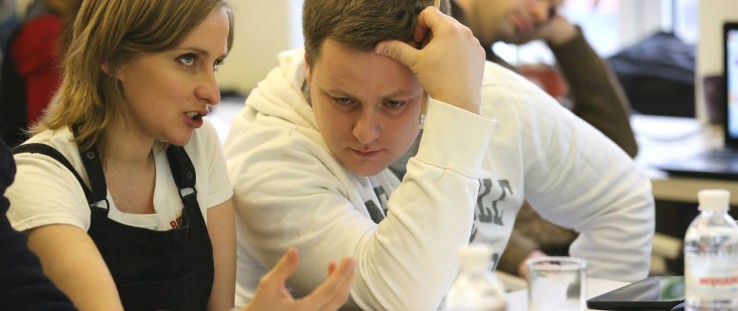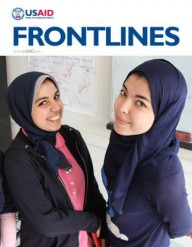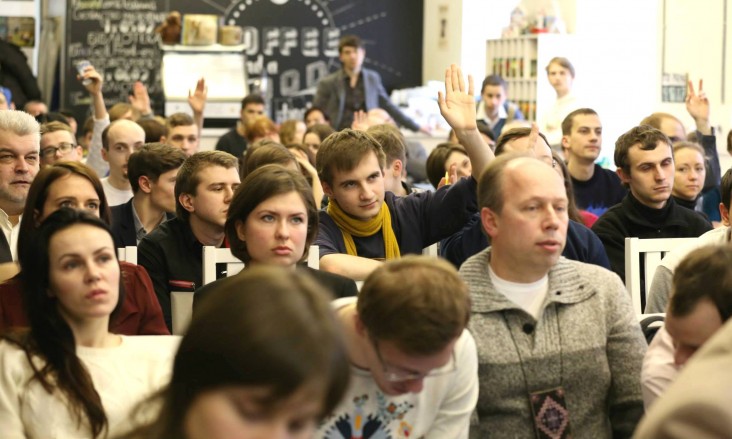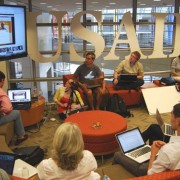 Judges confer after the presentation of a prototype at a hackathon in Ukraine in February 2015.
SocialBoost
Judges confer after the presentation of a prototype at a hackathon in Ukraine in February 2015.
SocialBoost
 Judges confer after the presentation of a prototype at a hackathon in Ukraine in February 2015.
SocialBoost
Judges confer after the presentation of a prototype at a hackathon in Ukraine in February 2015.
SocialBoost
KYIV, Ukraine—United by a common cause, more than 100 people—developers, graphic designers, journalists, activists and government officials—recently traveled from around Ukraine to pack a room in downtown Kyiv.
A mix of people in stylish suits and casual street clothes, most of the participants had never met before, and many had never engaged in any type of civic activism before. They arrived early to mingle near the buzzing coffee machine and share ideas.
After opening remarks, they quickly broke into small teams and started prototyping. The teams worked eagerly and feverishly through the night, occasionally taking power naps at their computers.
This massive two-day volunteer effort in February was a hackathon, an opportunity for participants to network and workshop creative solutions to existing problems. For the nearly 48 hours, the aim was to prototype a series of tools to help the Government of Ukraine better support internally displaced persons (IDPs) and conflict-affected communities in the East.
As of March, there were over 1 million IDPs in Ukraine—individuals who fled their homes in the East and Crimea because of fighting and concerns for their safety. Most IDPs are living with relatives, friends or volunteers. Many are dependent on the Ukrainian Government and volunteer organizations for basic social services, but do not have access to reliable and accurate information about how to access those services. Residents are helping alleviate the crisis, with volunteers helping IDPs navigate the registration process, locate housing, and secure clothing, food and medicine.
SocialBoost, a national NGO that promotes the use of open data for transparent government in Ukraine, organized the hackathon with funding from USAID. SocialBoost works closely with the Ukrainian Government to understand its needs and connect it to talent and volunteers within the technical community.
Denis Gursky, SocialBoost founder, said that it is exciting to see so many people in the IT community who are eager to use their skills to help IDPs. “In Ukraine, the IT community is strong and patriotic,” he said.
SocialBoost helped create a committee of judges from the Government of Ukraine, NGOs and the IT sector, including the presidential administration of Ukraine, Microsoft, SocialBoost and Vostok SOS, a national volunteer organization.
In Mid-January, SocialBoost quickly launched a multimedia campaign to crowdsource ideas on communication tools that might be useful for IDPs. The campaign used social media and paid advertisements to reach as many people as possible. Two weeks after the call for applications was launched, the event had over 150 registrations and more than 50 ideas were submitted to the online platform. Traffic to the online platform exceeded 22,000 people in six weeks, and the Facebook campaign reached 13,000 clicks on the ads.
The platform allowed the public to vote and comment on the ideas and register to participate in the hackathon. In total, over 21,000 people visited the platform, and 159 local people registered for the event.
SocialBoost also sent staff to visit IDP communities in Dnepropetrovsk and Odessa. Organized by local volunteer organizations that work with IDPs daily, the visits helped SocialBoost understand the most pressing issues facing IDPs and share those needs with hackathon participants.
USAID is supporting Ukrainian-led efforts to address the crisis by increasing access to information, and helping communities and government mitigate deepening tensions in conflict-affected communities.
“Our program has been working to help sustain the momentum that led to Ukraine’s historic political transition, and channel it to helping activists and volunteers resolve the challenges the country currently faces,” said Ben Long, deputy country representative for USAID’s Office of Transition Initiatives in Ukraine. “The IT sector in Ukraine is a vital part of the economy and has been essential in bringing about political change. It’s only obvious that it play a role in helping meet the needs of people who have been most affected by this current conflict and crisis.”
Ten projects were named finalists and representatives from each were invited to participate in the hackathon. Over two days, each project was translated from an idea to a prototype. At the end of the two days, each team presented its prototype to the judges, who voted based on five criteria: reach, potential impact, sustainability, technical components and teamwork.
The winning prototype: LifeTag, an SMS service that navigates IDPs to the nearest government or voluntary service based on their selection from a menu, from financial assistance to housing to counseling services. LifeTag was developed by Kyiv-Mohyla University students, including Liakh Andrii, 19.
“We thought we should make it accessible for everybody who has only a mobile phone and has no Internet access,” Andrii said. “So, we’ve had an idea and skills to make it happen, and why not ... start working on the project right the next day?”
Jonathan Katz, USAID’s deputy assistant administrator for Europe and Eurasia, attended the end of the hackathon to present the award to LifeTag.
“I was unbelievably impressed, not only with the winning team, but with all the participants,” Katz said. “The room was filled with an amazing energy and clear commitment to their fellow citizens impacted by the ongoing conflict. It really gave me confidence that, despite all the challenges, these young people will work tirelessly to ensure a brighter future for the people of Ukraine.”
Hlib Koshukov, another student on the winning team, said they were motivated to participate in the hackathon “because we all are responsible for everything that is happening in our country, and we were interested in making something good for people that are in trouble.”
The winning team was awarded about $1,700 to develop their product. The third runner-up, whose members developed a knowledge base on emergencies to teach people how to react before anything happens to them, also received follow-up funding. They have already launched the beta version of the service. Following the event, Microsoft presented each winner with a Startup BizSpark program and the MS Azure cloud computing platform.
Working closely with the winning team, SocialBoost launched the SMS service in April and is exploring options to partner with a national mobile operator. The online application is free of charge, and IDPs pay only for the SMS itself, according to their cell phone plan.














Comment
Make a general inquiry or suggest an improvement.